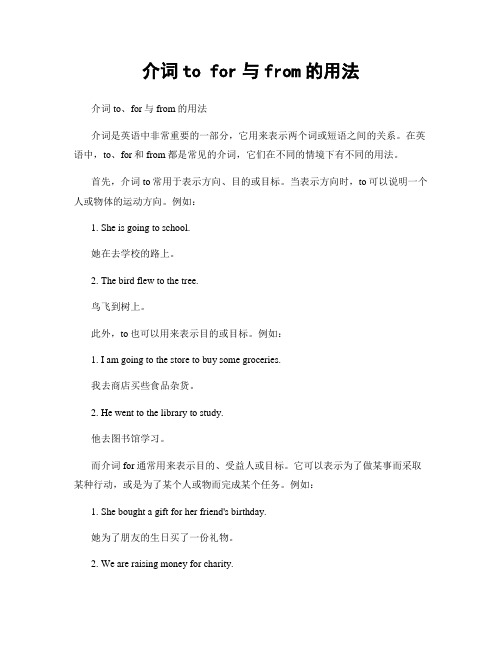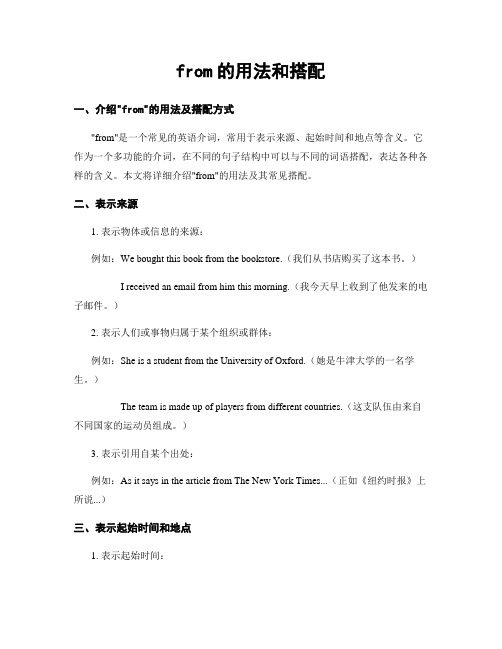介词from的语法特点与用法习惯
介词的常见用法与例句分析

介词的常见用法与例句分析介词是英语语法中十分重要的一部分,用来表示各种关系,连接其他词或短语。
在句子中,介词通常位于名词、代词、动词、形容词或副词之前,并指示它们之间的关系。
本文将介绍常见的介词用法,并给出相应的例句分析。
一、表示时间关系的介词1. "at"用于表示具体的时间点:- I will meet you at 7 o'clock.- We're having a party at the weekend.2. "on"用于表示具体的日期或星期:- She was born on January 1st, 1990.- We have a meeting on Monday.3. "in"用于表示较长的时间段:- I will finish this project in a month.- He went to Australia in 2010.二、表示地点关系的介词1. "in"表示大的范围或区域内:- The library is in the city center.- She lives in the United States.2. "on"表示接触或靠在某个表面上:- The book is on the table.- The picture is on the wall.3. "at"表示准确的位置:- I'm waiting for you at the bus stop.- They met at the park.三、表示移动方向的介词1. "to"表示向一个地点或目的地移动:- She walked to the store.- He is going to Paris.2. "from"表示从一个地点离开:- They came from Japan.- He returned from school.3. "through"表示穿过或经由某处:- We walked through the forest.- The road goes through the mountains.四、表示原因或目的的介词1. "for"表示目的或原因:- We go to school for education.- She bought flowers for her mother.2. "because of"表示因为:- The game was canceled because of the rain. - He was late because of the traffic jam.3. "with"表示伴随:- He went to the party with his friends.- She took a walk with her dog.五、表示方式或手段的介词1. "by"表示通过某种方式或手段:- We can travel by car.- He learned English by watching movies. 2. "with"表示使用某物或与某人合作:- He writes with a pen.- She painted the picture with watercolors.六、表示比较或对比的介词1. "than"表示比较级:- She is taller than her sister.- It's colder today than yesterday.2. "as"表示相同程度或相似性:- He is as tall as his father.- This book is as interesting as the previous one.七、其他常用介词1. "of"表示所属关系或材料:- The top of the mountain is covered with snow.- She made a doll out of clay.2. "at"表示注意或特定情况下:- Look at the beautiful sunset!- He was surprised at the news.3. "to"表示关系或方向:- She is nice to her colleagues.- He gave the book to me.总结:通过以上介词的常见用法与例句分析,我们可以看到介词在句子中承担着重要的作用,帮助我们准确表达时间、地点、移动方向、目的、方式、比较等关系。
介词 of from for by at during behind用法注意

介词of 用法注意1.表示所有关系,用以构成名词的所有格,如the gate of the school(校门),the se cret of success(成功的秘密),等。
注意以下正误表达:正:He is a friend of my father. 他是我父亲的一位朋友。
正:He is a friend of my father’s. 他是我父亲的一位朋友。
正:He is a friend of mine. 他是我的一位朋友。
误:He is a friend of me.以下表达是错误的:误:What’s the name of you?(改为…your name)误:Do you know the father of him?(改为…his father)误:I will show the books of me.(改为…my books)但是以下表达却是对的(of表示动宾关系):正:I hate the sight of him. 我讨厌看到他。
正:His criticism of her is serious. 他对她的批评是严肃的。
2.与age, shape, size, colour, height, design, weight 等名词连用,可用作表语或定语;其中的介词of 有时可省略。
如:The two boys are (of) the same height. 这两个男孩一样高。
Here is a piece of wood (of) the right size. 这有一块木头,其大小刚好适合。
When I was (of) your age, I lived in the country. 我像你这个年纪的时候,我住在乡下。
3.与某些名词(如help, value, interest, importance等)连用,相当于形容词,可用作定语或表语。
如:It’s not of mu ch value. 这没有多大价值。
介词在句子中的作用及常见用法总结

介词在句子中的作用及常见用法总结介词是英语语法中的一类词性,它在句子中起着连接词与短语、短语与句子之间关系的作用。
介词通常位于名词、代词、动词或形容词之前,用来表示时间、地点、方向、原因、目的等关系。
本文将总结介词在句子中的作用,并介绍一些常见的用法。
一、表示时间关系1. at:表示具体的时间点,如at 7 o'clock(在7点),at noon(在中午)。
2. in:表示较长的时间段,如in the morning(在早上),in May (在五月)。
3. on:表示某一天或特定日期,如on Sunday(在星期日),on January 1st(在1月1日)。
二、表示地点关系1. in:表示在一个封闭的区域内,如in the room(在房间内),in London(在伦敦)。
2. on:表示表面位置,如on the table(在桌子上),on the wall (在墙上)。
3. at:表示具体位置,如at the bus stop(在公交车站),at the corner(在拐角处)。
三、表示方向关系1. to:表示朝向某个地点,如go to school(去学校),walk to the park(走向公园)。
2. from:表示来自某个地点,如come from Japan(来自日本),receive a letter from him(收到他的信)。
四、表示原因关系1. because of:表示因为某个原因,如because of the rain(因为下雨)。
2. due to:与because of意义相似,但更正式,如due to the bad weather(由于天气不好)。
五、表示目的关系1. for:表示为了某个目的,如study hard for the exam(为了考试努力学习)。
2. to:表示某个动作的目的,如go to the supermarket to buy groceries(去超市买食品)。
介词to for与from的用法

介词to for与from的用法介词to、for与from的用法介词是英语中非常重要的一部分,它用来表示两个词或短语之间的关系。
在英语中,to、for和from都是常见的介词,它们在不同的情境下有不同的用法。
首先,介词to常用于表示方向、目的或目标。
当表示方向时,to可以说明一个人或物体的运动方向。
例如:1. She is going to school.她在去学校的路上。
2. The bird flew to the tree.鸟飞到树上。
此外,to也可以用来表示目的或目标。
例如:1. I am going to the store to buy some groceries.我去商店买些食品杂货。
2. He went to the library to study.他去图书馆学习。
而介词for通常用来表示目的、受益人或目标。
它可以表示为了做某事而采取某种行动,或是为了某个人或物而完成某个任务。
例如:1. She bought a gift for her friend's birthday.她为了朋友的生日买了一份礼物。
2. We are raising money for charity.我们正在为慈善事业筹集资金。
此外,for还可以表示“替代”或“代表”。
例如:1. I'll stand in line for you.我会替你排队。
2. He speaks for the company at the meeting.在会议上,他代表公司发言。
最后,介词from通常用来表示来源、起点或出发地。
当表示来源时,from表示某物或某人来自何处。
例如:1. I received a letter from my friend.我收到一封来自朋友的信。
2. This book is from the library.这本书是从图书馆借来的。
此外,from还可以表示出发地或起点。
例如:1. She traveled from New York to Los Angeles.她从纽约到洛杉矶旅行。
介词的用法及应用场景

介词的用法及应用场景介词是一种虚词,用于连接名词、代词、动词、形容词或副词与其他成分,表达它们之间的关系。
介词可以表示时间、地点、原因、目的、方式、手段等概念。
在语法上,介词通常放在名词或代词前面,构成介词短语。
介词的使用具有一定的规则,以下是一些常见的介词及其用法和应用场景。
1. 地点介词:地点介词用于表示人或物所处的位置或方向关系,常见的地点介词包括:- in: 表示在某个较大的范围内,比如in the room(在房间里)、in the city(在城市里)。
- on: 表示在某个表面上或靠近某个表面,比如on the table(在桌子上)、on the street(在街上)。
- at: 表示在某个位置或地点,比如at the park(在公园里)、at the bus stop (在公交车站)。
- by: 表示在某个物体或人旁边,比如by the river(在河边)、by the window (在窗边)。
- near: 表示在附近,比如near the supermarket(在超市附近)。
2. 时间介词:时间介词用于表示时间的关系,常见的时间介词包括:- in: 表示在未来某个时间段内,比如in a week(一周后)、in the morning(在早晨)。
- on: 表示在某个具体的日期或星期几,比如on Monday(星期一)、on July 4th (7月4日)。
- at: 表示在具体的某个时间点,比如at 2 o'clock(在2点钟)、at night(在晚上)。
- during: 表示在某个时间段内,比如during the summer(在夏天)、during the meeting(在会议期间)。
3. 原因和目的介词:原因介词用于表示某个动作或情况的原因,常见的原因介词包括:- because of: 表示由于某个原因,比如because of the rain(因为下雨)。
介词在句子中的作用和用法

介词在句子中的作用和用法介词是语法中一个重要的词类,用来表示人或物之间的关系。
它常常出现在句子中,起到连接句子成分、状语的作用。
介词通常位于名词或代词之前,用来修饰这些词的意义。
介词的用法有很多种,以下将介绍一些常见的用法和注意事项。
1. 表示关系介词可以表达时间、空间、方向、原因、目的、条件等关系。
常见的介词有:in、on、at、by、with、for、to等。
(1)时间关系:介词in用于表示在某个时间段内,如in the morning(在早上),in summer(在夏天);介词on用于表示具体某天或某一天的上午、下午等,如on Sunday(在星期天),on Monday afternoon(在星期一下午)。
(2)空间关系:介词in用于表示在某个空间范围内,如in the room(在房间里);介词on用于表示在某个平面或表面上,如on the table(在桌子上);介词at用于表示在某个点或地方,如at the bus stop(在公交车站)。
(3)方向关系:介词to用于表示朝向某个地方,如go to school (去学校);介词from用于表示来自某个地方,如come from Beijing (来自北京)。
(4)原因关系:介词for用于表示某个行为或状态的原因,如thank you for your help(谢谢你的帮助)。
(5)目的关系:介词for用于表示为了某个目的,如study hard for success(为了成功而努力学习)。
(6)条件关系:介词if用于表示条件,如if it rains(如果下雨)。
2. 合并句子介词可以用来合并两个句子,使句子更连贯。
常见的介词有:and、but、or等。
(1)and用于表示并列关系,连接两个相似的句子,如I like toread books and watch movies(我喜欢读书和看电影)。
(2)but用于表示转折关系,连接两个相反的句子,如She is smart but lazy(她聪明但懒惰)。
from的用法和搭配

from的用法和搭配一、介绍"from"的用法及搭配方式"from"是一个常见的英语介词,常用于表示来源、起始时间和地点等含义。
它作为一个多功能的介词,在不同的句子结构中可以与不同的词语搭配,表达各种各样的含义。
本文将详细介绍"from"的用法及其常见搭配。
二、表示来源1. 表示物体或信息的来源:例如:We bought this book from the bookstore.(我们从书店购买了这本书。
)I received an email from him this morning.(我今天早上收到了他发来的电子邮件。
)2. 表示人们或事物归属于某个组织或群体:例如:She is a student from the University of Oxford.(她是牛津大学的一名学生。
)The team is made up of players from different countries.(这支队伍由来自不同国家的运动员组成。
)3. 表示引用自某个出处:例如:As it says in the article from The New York Times...(正如《纽约时报》上所说...)三、表示起始时间和地点1. 表示起始时间:例如:I work from 9 am to 5 pm every day.(我每天从早上9点工作到下午5点。
)The show will run from September to December.(这个节目将从9月持续到12月。
)2. 表示起始地点:例如:He traveled from Tokyo to Osaka by train.(他乘火车从东京去大阪旅行。
)四、常见搭配1. 特定时间的表达:例如:from Monday to Friday(从周一到周五)from time to time(时常)2. 形容词和名词的搭配:例如:come from a wealthy family(来自一个富裕家庭)learn from experience(通过经验学习)3. 动词和介词短语的搭配:例如:benefit from(受益于)protecting the environment from pollution(保护环境免受污染)4. 介词短语和介词短语的搭配:例如:from beginning to end(从头到尾)from one place to another(从一个地方到另一个地方)五、总结"from"是一个多功能的英语介词,在句子中可以表示来源、起始时间和地点等含义。
[英语语法] 介词to, at, on, in, from,...
![[英语语法] 介词to, at, on, in, from,...](https://img.taocdn.com/s3/m/7a116922af45b307e8719779.png)
一、介词to的常见用法1. 动词 toadjust to适应 attend to处理;照料agree to赞同 amount to加起来达…belong to属于 come to达到drink to为…干杯 get to到达happen to发生在某人身上 hold to紧握lead to通向 listen to听,occur to想起 object to反对,point to指向 respond to回答,refer to参考;指的是…;涉及 reply to回答,see to负责 stick to坚持,turn to求助2. 动词( sth.) to sb.announce to通知某人 describe to向某人描述explain to向某人解释 express to对某人表达mention to提及 nod to向某人点头report to报告 say to告知hout to对某人大叫 suggest to提建议speak to与某人交谈 talk to跟某人谈话whisper to和某人低声耳语3. 动词 sth./sb. to sth./sb.add to增加 compare to比作carry to运送至 devote to致力于introduce to介绍给 invite to邀请参加join to连接到 leave to委托给reduce to下降至 sentence to判处take to带到4. be 形容词/过去分词 tobe alive to觉察;晓得 be attentive to注意;留心be awake to知晓 be blind to缺乏眼光be close to紧挨着 be common to对...很普通be contrary to违反;反对 be devoted to致力be deaf to不愿意听 be equal to有…的力量be exposed to暴露;遭受 be fair to对…公平be familiar to对某人来说熟悉 be grateful to对...心存感激be good to对…有好处 be harmful to对…有危害be important to对…重要 be kind to友好对待be known to周知于 be married to嫁给be moved to转移到 be near to靠近be necessary to对…有必要 be opposite to在对面be opposed to反对 be pleasant to合某人之意be proper to专属 be polite to礼貌待人be rude to粗暴对待 be relative to与…有关be strange to不习惯 be similar to类似be suitable to适合 be true to忠实be thankful to感激 be useful to对…有用be used to习惯5. to 名词构成的词组to a degree在某种程度上 to date到现在为止to one’s feet跳起来 to one’s mind照…看来to one’s surprise使…吃惊 to one’s taste符合胃口to oneself独自享用 to order定做to the letter不折不扣地 qto the point中肯地二、at的常见用法1. 动词 atarrive at抵达 call at访问某地catch at(it)当场抓住 come at攻击fire at向…开火 glance at瞟一眼glare at怒目而视 grieve at忧伤knock at敲 laugh at嘲笑look at看一眼 pull at拉扯rejoice at对…高兴 smile at向某人微笑shoot at朝…射击 stare at怒目而视thrust at刺向 tear at撕tremble at颤抖 wonder at吃惊work at工作2. be 形容词/过去分词 atbe angry at恼怒于 be alarmed at对…保持警觉be astonished at对…吃惊 be bad at不擅长be clever at对某事很灵巧 be delighted at高兴be disgusted at厌恶 be disappointed at对…失望be good at擅长 be impatient at对…不够耐心be mad at狂热于 be pleased at对…感到高兴be present at出席 be satisfied at满意be surprised at吃惊 be shocked at对…非常震惊be terrified at受到…的恐吓 be quick at对…很机敏3.at 名词构成的词组at a distance在一定距离 at a loss不知所措at a time一次 at all一点也不at any cost不惜一切代价 at best最好也只是at first起初 at hand手头at heart在内心里 at home在家;无拘束at last最后 at least至少at most最多 at once马上at present目前。
- 1、下载文档前请自行甄别文档内容的完整性,平台不提供额外的编辑、内容补充、找答案等附加服务。
- 2、"仅部分预览"的文档,不可在线预览部分如存在完整性等问题,可反馈申请退款(可完整预览的文档不适用该条件!)。
- 3、如文档侵犯您的权益,请联系客服反馈,我们会尽快为您处理(人工客服工作时间:9:00-18:30)。
介词f rom的语法特点与用法习惯
1.不要根据汉语意思在及物动词后误加介词from。
如:
他上个星期离开中国去日本了。
误:H e left from China for Japan last week.
正:H e left Chine for Japan last week.
另外,也不要根据汉语意思错用介词from。
如:
太阳从东方升起,从西方落下。
误:T he sun rises from the east and sets from the west.
正:T he sun rises in the east and sets in the west.
2.f rom虽然本身是介词,但它有时也可接介词短语作宾语。
如:
Choose a book from among these. 从这些书中选一本吧。
A man stepped out from behind the wall. 一个人从墙后走出来。
比较:
I took it from the bed. 我从床那儿(或床上)拿的。
I took it from under the bed. 我从床下拿的。
注意,下面一句用了from where(引导非限制性定语从句),而未用f rom which,其中的where=i n the tree,即from where=f rom in the tree。
如:
He hid himself in a tree, from where he could see the enemy in the distance. 他躲在一棵树上,从那儿他可以看到远处的敌人。
3.有时其后可接w hen, where引导的宾语从句,此时可视为其前省略了t he time, the place。
如:
He didn’t speak to me from when we moved in. 从我们迁入之时起,他没和我说过话。
From where I stood I could see everything clearly. 从我站的地方我一切都看得清清楚楚。
4.某些由f rom…t o…构成的习语通常不带冠词:
from house to house 挨家挨户
from hand to hand 从一人之手到他人之手
from time to time 不时地
from shop to shop 逐店
from day to day 一天天地
from head to foot 从头至脚,全身
from beginning to end从头至尾
from hand to mouth 赚一点吃一点,仅能糊口
from morning to night 从早到晚
英语微信群是目前学习英语最有效的方法,群里都是说英语,没有半个中文,而且规则非常严格,是一个超级不错的英语学习环境,群里有好多英语超好的超牛逼的人,还有鬼佬和外国美眉。
其实坦白说,如果自己一个人学习英语太孤独,太寂寞,没有办法坚持,好几次都会半途而废。
只要你加入到那个群里以后,自己就会每天都能在群里坚持学,坚持不停地说和练,由于是付费群,群里的成员学习氛围非常强,每天的训练度都非常猛,本来很懒惰的你一下子就被感染了,不由自主地被带动起来参与操练,不好意思偷懒,别人的刻苦学习精神会不知不觉影响你,EYC英语微信群(群主VX 601332975)可以彻底治好你的拖延症,里面学员都非常友好,总是给你不断的帮助和鼓励,让你学英语的路上重新燃起了斗志,因为每天都在运用,你的英语口语就能得到了迅猛的提升,现在可以随便给一个话题,都能用英文滔滔不绝的发表5分钟以上对这个话题的看法和观点,想提高英语口语的可以加入进来,It really works very well.。
